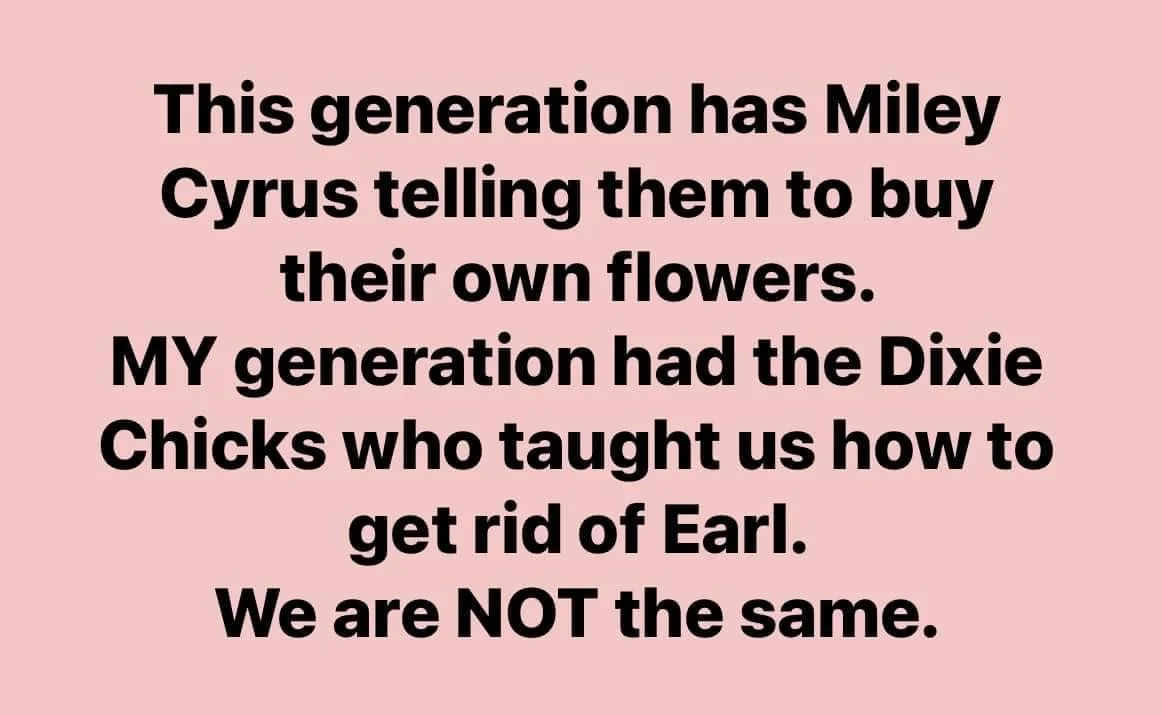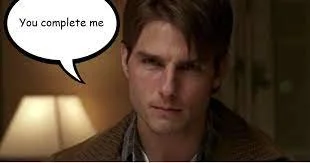I Can Buy Myself Flowers: Freeing Ourselves of Codependency
Have you seen this post?
Recently I saw this on Facebook. I agree. There is a big difference from today’s young women hearing the message in the song “Flowers” versus the young women of the 90’s who listened to the Dixie Chicks (now known as The Chicks) sing rebelliously about Earl.
I am grateful to hear a huge difference in these songs. I see it as a sign of progress.
Is it possible that this young woman in the 1990’s didn’t know she could buy her own flowers (self-love)? Is it possible that she didn’t know she could take herself dancing (having fun as a single)? Is it possible that she did not know the value of her own company (self-awareness) and the power of talking to herself (consciousness of her own inner beliefs)? Is it possible that she did not know she could hold her own hand (independence)? I am guessing her fear of being alone was greater than her self-worth, resulting in:
When this song was released, I remember being in my late twenties, joining my cohort women on the dance floor, cheering on Mary Anne and Wanda. I must confess, when I first heard this song and for many years that followed, I took pleasure in hearing the story of two brave, revenge-plotting women, who had me mentally cheering them on. Then one day I stopped and asked myself, “But wait, how does a woman find herself with an Earl?”
Then, as I learned how to buy myself flowers and hold my own hand, I heard some deeper questions rise up in me, “What happened to Earl? How did he arrive at such a harm-inflicting place? What was his story?”
Earl? Who cares about Earl? He is portrayed as the bad guy, a heartless perpetrator, who “nobody missed at all.” Yet at one point, Earl was a mother’s sweet infant son. So what happened?
I am imagining…
a man who is raised by a mother who loves herself enough that she can buy her own flowers. A mother who provides her son with a father who also has high self-worth and loves himself enough that he matches his self-empowered wife. A father who role models how lovingly treat his partner and meet his need for love and connection.
Was Earl a “bad guy” or a man lacking so severely in self-worth and self-love, that it led him to using profoundly harmful strategies in order to attain his need for love?
I am imagining…
the woman who was raised by a mother who loves herself enough to buy her own flowers. I am imagining a mother who role models compassion for an “Earl” to her daughter but knows her job is not to fix him or rescue him. A mother who knows when she loves herself fully, she will only have space for a partner who can meet her there. An “Earl” would never feel comfortable being in the presence of a woman so self-empowered.
Yes, the cultural messages have changed since the 1990s. The narratives are changing and for that I say, “Hallelujah!” Through the power of song, we are changing the narrative from vulnerability, entrapment and revenge to a narrative of self-confidence, choice and independence. As we learn how to buy ourselves flowers, as we recognize and embrace our own self-worth, we will lessen the need for abusive, revenge plotting songs. When women are connected to their own wisdom and self worth, there will be no need for settling. As women change the cultural narratives, the “Earls” will begin to fade because when women value themselves they become self-empowered mothers who raise a more conscious generation of men. A generation of men, who instead of being intimidated by feminine energy, learn how to match it, embrace it, and reap the rewards of being in the presence of a woman who knows her own inherent worth.
At the end of the classes I teach, I ask my students to join me in a ‘breathing and movement’ meditation. Then in stillness they repeat after me, “I am” sentences like, “I am kind, I am smart, I am healthy, I am considerate of other people’s needs...” The sentences vary from day to day, but the last one they repeat is always the same: “I am enough.”
What would happen if a generation of children were raised knowing that no matter what, they are enough? What would happen if they knew they didn't need a man, a partner, or even flowers from another to feel worthy? What would happen if they were connected to their own inherent worth? Would they begin to notice that the people they attracted equaled their self-worth? What if they did not desperately require a romantic partner in their lives in order to feel whole, but instead welcomed others into an already complete life?
Yes, Jerry McGuire, it is time we let go of your famous culturally dysfunctional line. It is a perfect example of codependency, and has been idolized by women for years… “You complete me.” Really Jerry? Give it up. Only you can do that. While you work on completing you, I will work on completing me. Then maybe we’ll talk.
As I enjoy a walk in nature, breathing in a beautiful winter landscape, I hear from within, “I am enough.” As a feeling of love and fullness rises up from within, I decide I am going to go buy myself some flowers…







